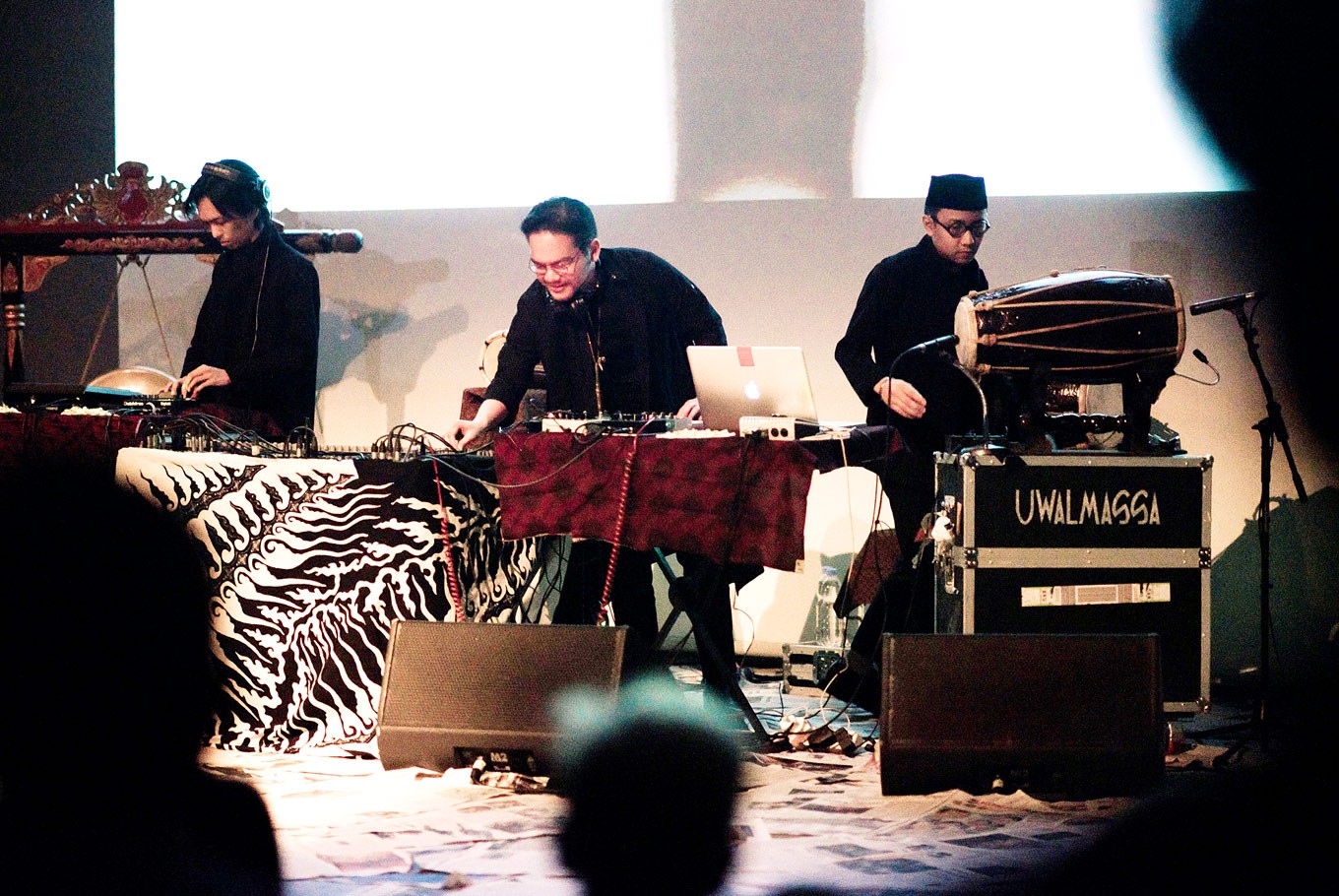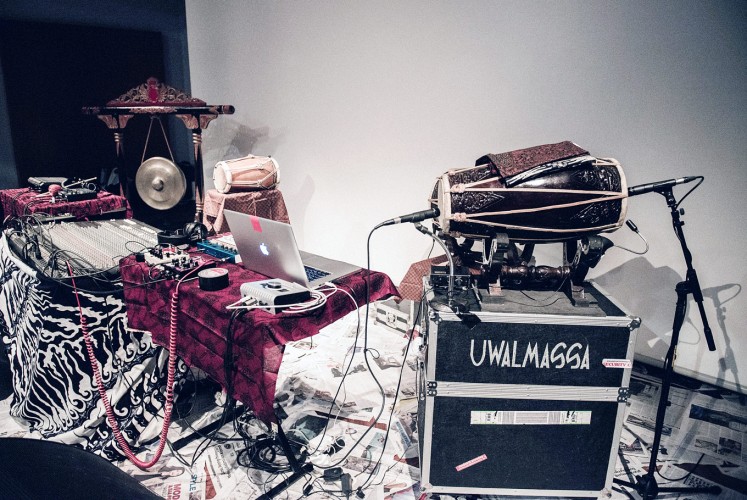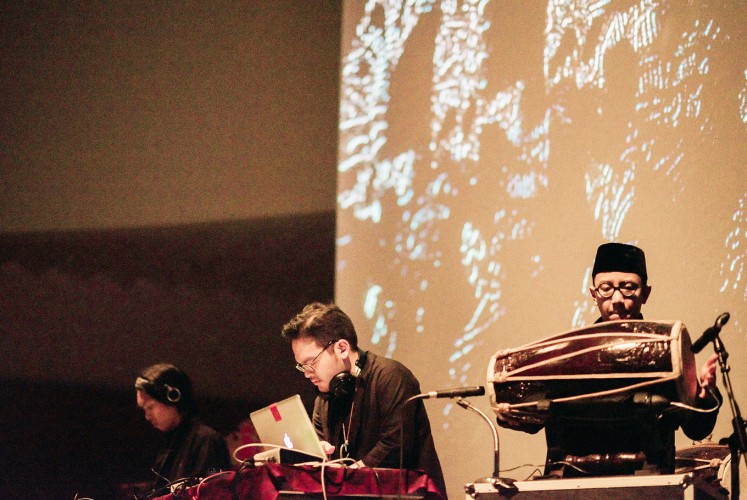Popular Reads
Top Results
Can't find what you're looking for?
View all search resultsPopular Reads
Top Results
Can't find what you're looking for?
View all search resultsUwalmassa: Sonic unity in diversity
Change text size
Gift Premium Articles
to Anyone
U
walmassa, a project inspired by global artists that catapults their traditional cultures onto the world stage through modern electronic music, is a bold experiment in putting Indonesia on the international cultural map.
A gong, multiple gendang and a bevy of electronic equipment were set on stage at the Goethe Institut theater.
The sounds that perforated from the stage enveloped the audience’s ears with familiar traditional sounds, coupled by tons of sonic and modern manipulation as if old traditions were experiencing a modern rebirth before their eyes.
It was electronic music, but of a completely different realm.
The sight of a world that was truthfully not far from wherever the audience was sitting was beamed by projectors. Hand-scanned images such as those of stone temple carvings, old parchment, masks and dances, transposed with dozens of rolling and tumbling texts in Sanskrit moved along the screen, displaying the best of Indonesian mysticism.
Out of the amplifiers came intricately constructed sounds that were sourced from traditional instruments and digitally manipulated to sound very modern. Many of its sounds were given life through longer, painstaking processes, resulting in sounds that matched nothing else.
The music and the sights sought to enter each individual in the audience, aiming at somewhat possessing them and succeeding.
This was a recent performance by Uwalmassa, a project started by musicians Harsya Wahono, Randy M. Pradipta and Pujangga Rahseta, which desires to elevate and present Indonesian heritage in simultaneously familiar and foreign ways.
Uwalmassa’s music itself harkens back to the bold experimental artists who aimed at integrating the sounds of their era into something familiarly Indonesian but at the same time foreign, pushing the classic idea of identity through diversity.
Harry Roesli and his Philosophy Gang project of the late 1970s comes to mind, as well as the dynamic Yogyakarta-based experimental duo Senyawa.
“It’s all about approaching the sounds of this era, the internet age, and how we connect the dots to our heritage,” producer Harsya Wahono says. “People in other countries have done it successfully and we’ve heard of them. The idea is, where are Indonesia’s artists?”
An amalgam of electronically manipulated sounds from various cultures is embodied in the trio’s music along with visual aspects. It only makes sense for Harsya to bring Indonesia’s uniqueness together into one form.
Mixing it up: Uwalmassa combines traditional Indonesian instruments with modern ones to create a unique sound. (Davian Akbar/File)Harsya’s own label Divisi 62, under which Uwalmassa’s material is released, was built on a concept that concerns Indonesia’s diverse traditions. Divisi 62 sees itself as a modern label where Indonesian heritage and history can propel the culture further into the future rather than being only of nostalgic use.
The label is focused on emphasizing Indonesian heritage on a grand visual and sonic scale. It has done so much so that in the span of just two years, Uwalmassa managed to spread its ideas into foreign lands.
Last year, Uwalmassa embarked on a tour of Europe to take its show to audiences who Harsya described as “surprised” that something as gripping and unique as this comes from Indonesia, a country that has not really registered in the minds of many Westerners.
Part of the tour included the Europalia Festival in several cities in Belgium and the Netherlands, while also making time to perform several shows in Germany, one of which was held in the main room of famous Berlin club Berghain, organized by experimental artist and Morphine Records boss Rabih Beaini.
They played at a series of shows in Berghain, called Raung Raya, orchestrated by Beaini that spanned several days, showcasing the best of Indonesia’s overlooked experimental and traditional artists. Aside from Uwalmassa, artists such as Indonesian electronic music pioneer Otto Siddharta, the jungga stringed music of Ata Ratu and Bandung-based collective Tarawangsawelas were among those who featured in the event series.
“What’s really amazing about the event wasn’t the fact that we performed in Berghain. It was the fact that one person, outside of our culture, was willing to bring artists from Indonesia that he felt embodied the same spirit as the techno that lives inside the club’s walls,” Harsya comments.
However, the concert series came to an abrupt and unpleasant end, for reasons that were beyond Beaini’s control, thereby cancelling shows from Ata Ratu, Senyawa and Al Suwardi. While the reasons left a bitter taste in Harsya’s mouth, the predicament has only driven him to aim higher.
Another realm: A projector beams images of stone temple carvings, old parchment, masks and dances, transposed with dozens of rolling and tumbling texts in Sanskrit, displaying the best of Indonesian mysticism, during Uwalmassa’s performance at the Goethehaus. (Davian Akbar/File)With all of Uwalmassa’s achievements in successfully blending sonic Eastern traditions with the best of electronic music, Harsya feels that it is now the time to move forward and expand beyond Uwalmassa, as the cultural recognition behind Uwalmassa and Divisi 62 is something that must not be given up on.
“[Rabih Beaini], from Lebanon, singlehandedly invested in all of us to carry out the project and he gave us full confidence over what we were doing. If you think about it, is our government willing to invest in us, relatively unknowns, to help further our culture?” he asks.
“Whatever the answer to that is, what’s certain is that Rabih’s dedication gave me the confidence to further the idea of making Indonesian heritage the foundation of Uwalmassa and Divisi 62, on my own strength. It can be done, surely.”













